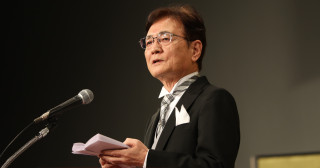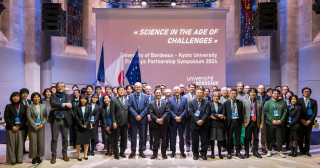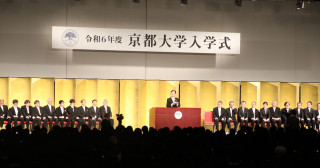The Bristol-Heidelberg-Kyoto Symposium, held in collaboration between Kyoto University, the University of Bristol, and Heidelberg University, was held at the University of Bristol in the UK on 5–6 November 2015.
Kyoto University periodically holds such joint symposia with its partner institutions around the world. Two bilateral symposia have been held between Bristol and Kyoto (in 2013 and 2014), and bilateral collaboration with Heidelberg University has been developed through the HeKKSaGOn Consortium, an alliance of leading German and Japanese universities.
This Bristol-Heidelberg-Kyoto Symposium aimed to broaden the existing bilateral frameworks and explore new possibilities for the promotion of academic exchange and collaborative research in strategic areas common to the three universities. Approximately 60 researchers from the three universities attended the symposium.
On the day preceding the symposium, the delegations from Kyoto and Heidelberg enjoyed a guided tour of the city of Bristol, visiting the Wills Memorial Building and the famous Clifton Suspension Bridge. At a reception held in the evening, Prof Hugh Brady, Vice-Chancellor of the University of Bristol, warmly welcomed the participants.
The symposium's five academic sessions were held in parallel on the following day. The sessions focused on the themes of Healthy Living and Active Ageing, Plant Sciences, Chemistry and Materials, Global Political Economy and Migration, and Gender in Popular Culture. The sessions gave the participating scholars an opportunity to share their research findings and explore possibilities for collaboration, enhancing cooperative links between researchers at the three universities.
Some of the sessions also included visits to research facilities at Bristol University. For example, the group in the Healthy Living and Active Ageing session visited SPHERE (Sensor Platform for Healthcare in a Residential Environment), an interdisciplinary research center developing sensor systems to monitor health and wellbeing in the home. The researchers from Kyoto were impressed to see new sensor-based technologies that are being developed to aid early diagnosis and promote lifestyle changes to preempt conditions such as stroke and obesity.
Also during the symposium, a partnership agreement was concluded between the botanic gardens of the three universities. The University of Bristol Botanic Garden and the Botanical Garden of Kyoto University's Graduate School of Science had previously concluded a bilateral agreement, and the inclusion of Heidelberg University's Botanical Garden and Herbarium, one of the world's oldest university-affiliated botanical gardens (established in 1593), promises to facilitate enhanced collaboration between plant scientists at the three universities.

Memorial Hall at University of Bristol

Welcome speech by Vice-Chancellor Brady, University of Bristol

Signing of the Memorandum of Understanding by the three universities' botanical gardens

Chemistry and Materials Session

Group photo





